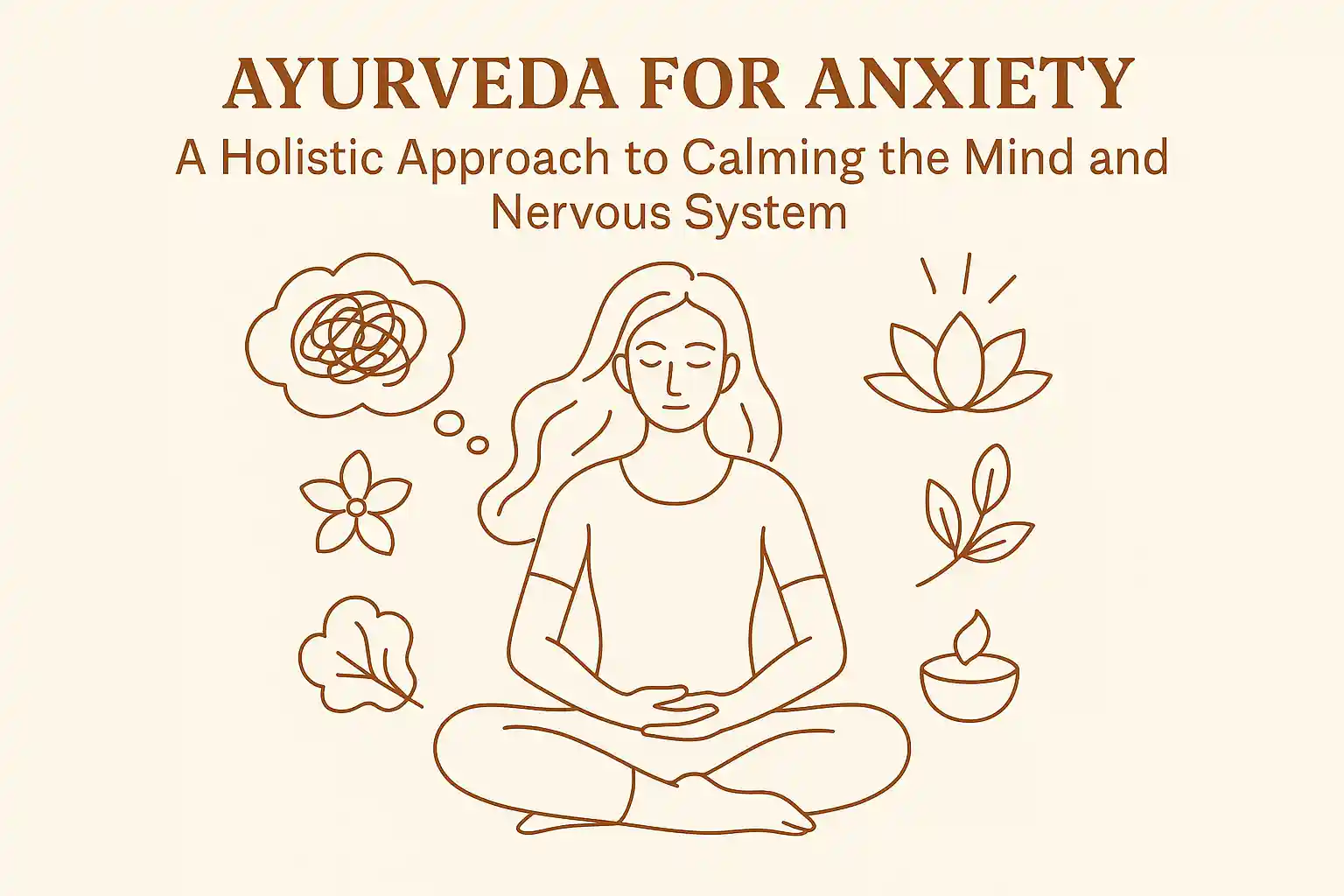In Ayurveda, anxiety is closely associated with an imbalance in Vata Dosha, the principle of movement, which governs the nervous system, thoughts, and elimination. When Vata becomes aggravated—through overstimulation, lack of grounding, or erratic routines—it leads to symptoms like restlessness, worry, racing thoughts, and sleep disturbances.
This article explores how Ayurvedic principles can help calm anxiety by restoring balance to the mind and body through diet, lifestyle, herbs, and daily routines. Classical texts such as the Ashtanga Hridayam (Sutrasthana 1.20–23) describe Prana Vata as the force that governs mental energy, respiration, and the coordination between senses and intellect—a system easily disturbed under stress. Learn how traditional approaches complement modern anxiety treatments.
Personalized Anti-Anxiety Meal Planner
Get a customized meal plan designed specifically for your dosha and anxiety levels using traditional Ayurvedic principles for nervous system support.
Understanding Anxiety in Ayurveda
Anxiety is viewed in Ayurveda as a disturbance of Prana Vata, a sub-dosha of Vata that governs mental energy, breath, and heart rhythm. When Prana Vata is aggravated, it disrupts the coordination between the mind, senses, and nervous system.
Common signs of Vata-type anxiety:
- Racing or looping thoughts
- Insomnia or disturbed sleep
- Cold hands and feet
- Dryness (skin, bowels, voice)
- Sensitivity to noise and overstimulation
- Feeling "ungrounded" or disconnected
Prana Vata also interacts with Udana Vata, which governs speech and self-expression—explaining why anxiety often affects communication and confidence.
Ayurvedic Diet to Calm Anxiety
The Ayurvedic diet for anxiety focuses on grounding, warming, and nourishing foods that calm Vata and support stable mental function.
Recommended Foods:
- Warm, moist meals: Soups, stews, and kitchari
- Healthy fats: Ghee, olive oil, sesame oil
- Cooked root vegetables: Carrots, sweet potatoes, beets
- Mild warming spices: Cumin, fennel, cinnamon, ginger
- Whole grains: Oats, rice, quinoa (well-cooked)
- Stewed fruits: Apples, pears, dates with cardamom or nutmeg
Foods to Avoid:
- Caffeine, alcohol, and stimulants
- Dry or raw foods (e.g., granola, salads)
- Cold or leftover food
- Excessive spicy or fried items
These foods help rebuild Agni, which often becomes erratic or weak under anxiety. A stable digestive fire supports both physical and mental resilience.
Lifestyle Practices to Reduce Anxiety
Ayurveda recommends routine and rhythm to soothe an overactive Vata mind.
Daily Practices:
- Follow a daily routine (Dinacharya): Wake, eat, and sleep at regular times
- Abhyanga (self-massage): Apply warm sesame oil before showering
- Slow, grounding yoga: Gentle forward folds, long exhales, restorative poses
- Breathwork (Pranayama): Nadi Shodhana, Brahmari, and Ujjayi are especially calming
Environmental Support:
- Digital sunset: Avoid screens 1–2 hours before bed
- Spend time in nature: Especially near trees, earth, or water
- Create calm spaces: Reduce clutter and noise in living areas
- Regular sleep schedule: In bed by 10 PM for optimal nervous system recovery
Real-World Example: Regulating Vata to Relieve Anxiety
One client with Vata-Pitta constitution experienced rising anxiety during work travel: insomnia, rapid heartbeat, and looping thoughts. Her Ayurvedic plan included warm oil abhyanga, daily stewed apples with cinnamon, and 500 mg Ashwagandha twice daily. By day 10, she was sleeping deeply and felt emotionally anchored. This case illustrates how simple Vata-calming strategies can yield profound shifts.
Herbal Allies for Calming the Mind
Herbs in Ayurveda are selected for their nervine and Rasayana (rejuvenating) properties.
| Herb | Benefits for Anxiety | How to Use |
|---|---|---|
| Ashwagandha | Strengthens the nervous system and reduces cortisol | 300-500mg twice daily with warm milk |
| Brahmi (Gotu Kola) | Enhances clarity, calms mental chatter | 1/2 tsp powder in warm water before meals |
| Shankhpushpi | Promotes deep sleep and emotional resilience | 1 tsp syrup or powder at bedtime |
| Jatamansi | Grounding, sedative, ideal for Vata-induced insomnia | 1/4 tsp powder with honey before bed |
| Nutmeg | Supports deep sleep and nervous system | Tiny pinch in warm milk at bedtime |
Ayurvedic physicians may also use classical formulations such as:
- Saraswatarishta: Supports cognition and nervous strength
- Manasamitra Vatakam: Traditional formula for anxiety, fear, and emotional imbalance
Vata-Pacifying Evening Routine for Anxiety
Create a soothing wind-down ritual to anchor the nervous system:
Evening Anxiety-Relief Routine
- 6:00 PM: Light dinner with warm, cooked foods
- 7:00 PM: Warm herbal tea (chamomile, tulsi, or rose)
- 8:00 PM: Light abhyanga with sesame oil on feet and scalp
- 8:30 PM: Read calming literature or journal
- 9:00 PM: Practice Nadi Shodhana (alternate nostril breathing)
- 10:00 PM: Sleep by 10 PM for optimal nervous system recovery
In chronic cases, Ayurvedic practitioners may also recommend Nasya therapy (oil to the nasal passages), Brahmi oil head massage, or Shirodhara as part of a broader Vata-nourishing protocol.
When to Seek Professional Support
Ayurveda can be deeply supportive, but it works best in partnership with professional care. If anxiety persists or worsens, seek help from a qualified mental health professional or integrative practitioner.
Frequently Asked Questions
Sources & Further Reading
Mental Health Research
Traditional Sources
Related Articles

Foods to Avoid for Vata Dosha: An Ayurvedic Guide
Understanding which foods to avoid is crucial for Vata balance. Learn about cold, dry, and light foods that can aggravate Vata dosha and discover better alternatives for digestive health.
6 min read
